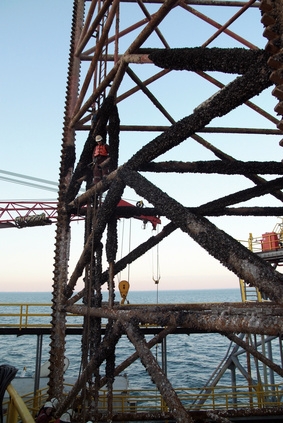
Offshore drilling often receives a bad reputation for causing environment problems, however there are benefits to offshore drilling. Offshore rigs help the local economy, create jobs, reduce dependency on foreign fuels and surprisingly also create homes for marine life. In addition, the majority of oil spills occur during the transportation of oil not during the drilling, although there are obvious exceptions. According to Humberto Fontova, the "Outer Continental Shelf, holds an estimated 115 billion barrels of oil and 633 trillion cubic feet of natural gas."
Offshore oil rigs provide many primary, secondary and tertiary jobs. Primary workers are those who work on the rig itself and include specialized technicians, laborers, cooks, doctors, scientists and a number of other specialized workers. Secondary jobs are those that support the rig: food distributors who bring in supplies and parts manufacturers who help set up the rig itself. Tertiary jobs are found among those who transport the oil to refining stations and work onshore in labs and refining stations. Offshore oil rigs keep many people working and help support local economies.
Offshore drilling helps the United States harvest rich deposits of oil that are located on domestic soil. This reduces dependency on foreign oil and brings the cost of oil down for the average American. Expensive transportation fees are avoided as oil harvested and refined domestically costs much less to transport.
Surprisingly the environment can benefit from offshore drilling, if there are no accidents. Offshore rigs are massive structures in the ocean that attract a wide variety of marine life. Fish, birds and other sea creatures come to the rig and make it their home. The rig acts as an artificial reef that helps life flourish as many animals use it for breeding.